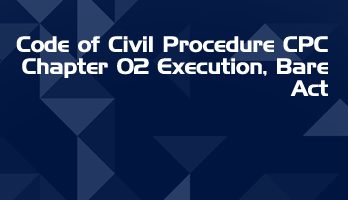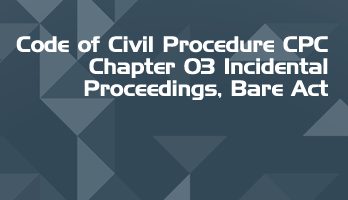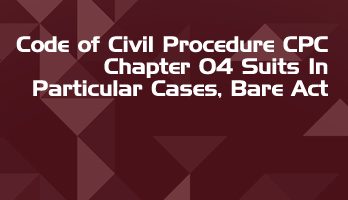Most acts are accompanied by 'subsidiary legislation' such as rules, regulations, notifications and orders; which address the actual implementation detail of the act.
Free Full Course Available on LawMint's YouTube Channel
How to Land Your Dream LLB Internship in a Top Law Firm
- Part 1 - Introduction
- Part 2 - Internship Planning
- Part 3 - Internship Research
- Part 4 - Building Your Profile
- Part 5 - The Email
- Part 6 - The Resume
- Part 7 - The Cover Letter
- Part 8 - The Interview
- Part 9 - Self Development
Practical and comprehensive course, with real examples and step-by-step analysis of the complete internship application process. Check out LawMint's YouTube channel now!
Code of Criminal Procedure, 1973
Chapter 34 – Disposal Of Property
Section 451 – Order for custody and disposal of property pending trial in certain cases
When any property is produced before any Criminal Court during an inquiry or trial, the Court may make such order as it thinks fit for the proper custody of such property pending the conclusion of the inquiry or trial, and, if the property is subject to speedy and natural decay, or if it is otherwise expedient so to do, the Court may, after recording such evidence as it thinks necessary, order it to be sold or otherwise disposed of. Explanation – For the purposes of this section, “property” includes:
- property of any kind or document which is produced before the Court or which is in its custody.
- any property regarding which an offence appears to have been committed or which appears to have been used for the commission of any offence.
Section 452 – Order for disposal of property at conclusion of trial
- When an inquiry or trial in any Criminal Court is concluded, the Court may make such order as it thinks fit for the disposal, by destruction, confiscation or delivery to any person claiming to be entitled to possession thereof or otherwise, of any property or document produced before it or in its custody, or regarding which any offence appears to have been committed, or which has been used for the commission of any offence.
- An order may be made under Sub – Section (1) for the delivery of any property to any person claiming to be entitled to the possession thereof, without any condition or on condition that he executes a bond with or without sureties, to the satisfaction of the Court, engaging to restore such property to the Court if the order made under Sub – Section (1) is modified or set aside on appeal or revision.
- A Court of Session may, instead of itself making an order under Sub – Section (1), direct the property to be delivered to the Chief Judicial Magistrate, who shall thereupon deal with it in the manner provided in sections 457, 458 and 459.
- Except where the properly is livestock or is subject to speedy and natural decay, or where a bond has been executed in pursuance of Sub – Section (2), an order made under Sub – Section (1) shall not be carried out for two months, or when an appeal is presented, until such appeal has been disposed of.
- In this section, the term “property” includes, in the case of properly regarding which an offence appears to have been committed, not only such property as has been originally in the possession or under the control of any party, but also any property into or for which the same may have been converted or exchanged, and anything acquired by such conversion or exchange, whether immediately or otherwise.
Section 453 – Payment to innocent purchaser of money found on accused
When any person is convicted of any offence which includes, or amounts to, theft or receiving stolen property, and it is proved that any other person bought the stolen property from him without knowing or having reason to believe that the same was stolen, and that any money has on his arrest been taken out of the possession of the convicted person, the Court may, on me application of such purchaser and on the restitution of the stolen property to the person entitled to the possession thereof, order that out of such money a sum not exceeding the price paid by such purchaser be delivered to him.
Section 454 – Appeal against orders under section 452 or section 453
- Any person aggrieved by an order made by a Court under section 452 or section 453, may appeal against it to the Court to which appeals ordinarily lie from convictions by the former Court.
- On such appeal, the Appellate Court may direct the order to be stayed pending disposal of the appeal, or may modify, alter or annul the order and make any further orders that may be just.
- The powers referred to in Sub – Section (2) may also be exercised by a Court of appeal, confirmation or revision while dealing with the case in which the order referred to in Sub – Section (1) was made.
Section 455 – Destruction of libellous and other matter
- On a conviction under section 292, section 293, section 501 or section 502 of the Indian Penal Code (45 of 1860), the Court may order the destruction of all the copies of the thing in respect of which the conviction was had, and which are in the custody of the Court or remain in the possession or power of the person convicted.
- The Court may, in like manner, on a conviction under section 272, section 273, section 274, or section 275 of the Indian Penal Code (45 of 1860), order the food, drink drug or medical preparation in respect of which the conviction was had, to be destroyed.
Section 456 – Power to restore possession of immovable property
- When a person is convicted of an offence attended by criminal force or show of force or by criminal intimidation, and it appears to the Court that, by such force or show of force or intimidation, any person has been dispossessed of any immovable property, the Court may, if it thinks fit, order that possession of the same be restored to that person after evicting by force, if necessary, any other person who may be in possession of the property: Provided that no such order shall be made by the Court more than one month after the date of the conviction.
- Where the Court trying the offence has not made an order under Sub – Section (1), the Court of appeal, confirmation or revision may, if it thinks fit, make such order while disposing of the appeal, reference or revision, as the case may be.
- Where an order has been made under Sub – Section (1), the provisions of section 454 shall apply in relation thereto as they apply in relation to an order under section 453.
- No order made under this section shall prejudice any right or interest to or in such immovable property which any person may be able to establish in a civil suit.
Section 457 – Procedure by police upon seizure of property
- Whenever the seizure of property by any police officer is reported to a Magistrate under the provisions of this Code, and such property is not produced before a Criminal Court during an inquiry or trial, the Magistrate may make such order as he thinks fit respecting the disposal of such property or the delivery of such properly to the person entitled to the possession thereof, or if such person cannot be ascertained, respecting the custody and production of such property.
- If the person so entitled is known, the Magistrate may order the property to be delivered to him on such conditions (if any) as the Magistrate thinks fit and if such person is unknown, the Magistrate may detain it and shall, in such case, issue a proclamation specifying the articles of which such property consists, and requiring any person who may have a claim thereto, to appear before him and establish his claim within six months from the date of such proclamation.
Section 458 – Procedure when no claimant appears within six months
- If no person within such period establishes his claim to such property, and if the person in whose possession such property was found is unable to show that it was legally acquired by him, the Magistrate may by order direct that such property shall be at the disposal of the State Government and may be sold by that Government and the proceeds of such sale shall be dealt with in such manner as may be prescribed.
- An appeal shall lie against any such order to the Court to which appeals ordinarily lie from convictions by the Magistrate.
Section 459 – Power to sell perishable property
If the person entitled to the possession of such property is unknown or absent and the property is subject to speedy and natural decay, or if the Magistrate to whom its seizure is reported is of opinion that its sale would be for the benefit of the owner, or that the value of such property is less than five hundred rupees, the Magistrate may at any time direct it to be sold; and the provisions of sections 457 and 458 shall, as nearly as may be practicable, apply to the net proceeds of such sale.
Important Central Acts in Regional Languages
Legislative department website also features regional language versions of several important Central Acts.
Free Full Course Available on LawMint's YouTube Channel
How to Land Your Dream LLB Internship in a Top Law Firm
- Part 1 - Introduction
- Part 2 - Internship Planning
- Part 3 - Internship Research
- Part 4 - Building Your Profile
- Part 5 - The Email
- Part 6 - The Resume
- Part 7 - The Cover Letter
- Part 8 - The Interview
- Part 9 - Self Development
Practical and comprehensive course, with real examples and step-by-step analysis of the complete internship application process. Check out LawMint's YouTube channel now!












